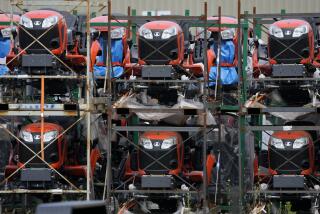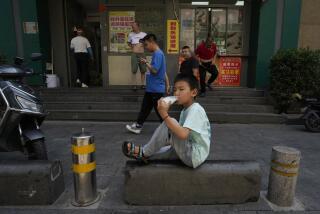China’s Growth Spurt a Concern
China’s racing economy sped up late last year, beating expectations but fanning worries that it may overheat in 2004, and the government Tuesday forecast continued strong growth this quarter.
Gross domestic product surged 9.9% in the fourth quarter of 2003 compared with the same period a year earlier, and for the year grew 9.1%, which the government said was its fastest annual growth rate since 1997.
“It was a hard-won successful achievement after the outbreak of the SARS epidemic and frequent natural disasters,” said Li Deshui, commissioner of the National Bureau of Statistics.
China, the world’s fastest-growing major economy, is counting on strong growth to underpin crucial reforms such as recapitalizing its ailing banks and shoring up inefficient state companies.
China also has become an increasingly important pillar of the global economy, turning itself into the world’s factory.
Its 2003 growth came despite the side effects of severe acute respiratory syndrome, which thumped consumer spending, foreign investment and factory output in the second quarter.
In its first-ever revision of GDP data, the bureau said third-quarter economic output was 9.6% higher than a year earlier, compared with the 9.1% reported previously.
The change reflected tries by China to polish its data, the accuracy of which has long been doubted by economists.
Chinese industrial output ended the year in strong shape, up 18.1% in December compared with a year earlier. Factory output for 2003 rose 17%.
The economy also was helped by improving retail sales, which have been a relative weak spot. Sales rose 10.9% in December and 9.1% for the year.
Many economists see Chinese growth easing in 2004 as steps taken last year to cool off heated sectors such as property continue to have an effect.
This year, Beijing is expected to ease state spending and take further steps to cool lending to industries seen in danger of overheating -- building up too much capacity that would leave them with excess debt and unsold products, raising the risk of business failures.
More to Read
Inside the business of entertainment
The Wide Shot brings you news, analysis and insights on everything from streaming wars to production — and what it all means for the future.
You may occasionally receive promotional content from the Los Angeles Times.









